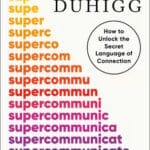Reading Time: < 1 min We all know that our time is limited. 86,400 seconds every day seems like a lot, but our entire life is only around 4,000 weeks (if we’re lucky) which sounds shockingly short. If someone is willing to gift some of their time to you, you should respond accordingly. In his book “Giftology“, author John Ruhlin […]
Empathy
Theoretically altruistic journalism
Reading Time: 2 min The latest episode of the “You’re Wrong About” podcast focuses on phones, and makes the argument that phones are generally a good thing for people to have — even teens. Included in the show was a discussion on the potential ban of TikTok, where they shared: And it’s not about improving these systems or improving […]
Draw out multiple identities
Reading Time: < 1 min One of my favorite new words in the past few years is “sonder” — that moment when you realize that everyone around you has an internal life as rich and as conflicted as yours. With that always on my mind, I tend to notice more areas where it might apply. One of those was in […]
Central points versus name-calling
Reading Time: 2 min In Adam Grant’s book “Think Again” he references Paul Graham’s “hierarchy of disagreement”, saying: “In the hierarchy of disagreement created by computer scientist Paul Graham, the highest form of argument is refuting the central point, and the lowest is name-calling.” This hierarchy wasn’t one that I was familiar with, so I took some to understand […]
Sifting through the chaff and grain
Reading Time: < 1 min There are certain people in your life that are indispensable. They can be indispensable in various ways, but I loved this description from Dinah Maria Craik (from her book “A Life for a Life“, as shared in Kevin Paul Scott’s “Inspired Every Day“). Dinah said: “Oh the comfort of feeling safe with a person, having […]
Who is the best listener you know?
Reading Time: < 1 min I was recently reading Kevin Paul Scott’s “Inspired Every Day“, and one little statement he made hit me very hard. He simply said: “Who is the best listener you know? What is that person’s impact on you and others?” It hit because this should (in theory) be me, but it’s not. It’s hard to really […]
Understanding doesn’t mean agreement
Reading Time: < 1 min Understanding can be a powerful thing. Whether it means understanding people on the other side of the political aisle or just sonder in general, more understanding leads to better outcomes for everyone. In the book “Crucial Conversations“, the authors offer a similar take, saying: “To keep ourselves from feeling like sellouts while exploring others’ paths—no […]
Grateful in the macro and the micro
Reading Time: 2 min When you ask someone what they’re grateful for, you often get the same kinds of things – health, family, friends, etc. Those are all wonderful things, and we should all be grateful for them, but being grateful for smaller things can sometimes have a bigger impact. In a recent episode of “My First Million”, the […]
Learning conversations
Reading Time: < 1 min There are many types of conversations that we can have with others, but one of my favorites is a “learning conversation”, as explained by Charles Duhigg in “Supercommunicators“: Our goal, for the most meaningful discussions, should be to have a “learning conversation.” Specifically, we want to learn how the people around us see the world […]
Present or be present?
Reading Time: 2 min The title of this post may be a little confusing, but spelled out it’s: Present (“pre-sent”, like giving a presentation) or be present (“pres-ent”, like being active in the room). In many cases, those are two different things. If you have an important presentation to give, you may often distance yourself from those in the […]







